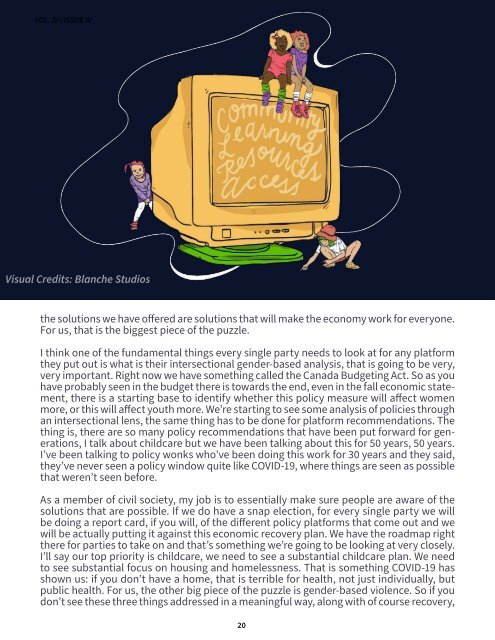Create successful ePaper yourself
Turn your PDF publications into a flip-book with our unique Google optimized e-Paper software.
VOL. IV | ISSUE IV<br />
MARGINS<br />
Visual Credits: Blanche Studios<br />
the solutions we have offered are solutions that will make the economy work for everyone.<br />
For us, that is the biggest piece of the puzzle.<br />
I think one of the fundamental things every single party needs to look at for any platform<br />
they put out is what is their intersectional gender-based analysis, that is going to be very,<br />
very important. Right now we have something called the Canada Budgeting Act. So as you<br />
have probably seen in the budget there is towards the end, even in the fall economic statement,<br />
there is a starting base to identify whether this policy measure will affect women<br />
more, or this will affect youth more. We’re starting to see some analysis of policies through<br />
an intersectional lens, the same thing has to be done for platform recommendations. The<br />
thing is, there are so many policy recommendations that have been put forward for generations,<br />
I talk about childcare but we have been talking about this for 50 years, 50 years.<br />
I’ve been talking to policy wonks who’ve been doing this work for 30 years and they said,<br />
they’ve never seen a policy window quite like COVID-19, where things are seen as possible<br />
that weren’t seen before.<br />
As a member of civil society, my job is to essentially make sure people are aware of the<br />
solutions that are possible. If we do have a snap election, for every single party we will<br />
be doing a report card, if you will, of the different policy platforms that come out and we<br />
will be actually putting it against this economic recovery plan. We have the roadmap right<br />
there for parties to take on and that’s something we’re going to be looking at very closely.<br />
I’ll say our top priority is childcare, we need to see a substantial childcare plan. We need<br />
to see substantial focus on housing and homelessness. That is something COVID-19 has<br />
shown us: if you don’t have a home, that is terrible for health, not just individually, but<br />
public health. For us, the other big piece of the puzzle is gender-based violence. So if you<br />
don’t see these three things addressed in a meaningful way, along with of course recovery,<br />
20<br />
that’s something we’ll be disappointed by.<br />
FA: So the last question, I guess we spent a lot of today talking about some long<br />
term goals and sort of what we’ve seen so far. How do you measure success? Is it<br />
appropriate?<br />
AS: Yeah, that’s a great question. I think as an organization in this very challenging media<br />
landscape, it’s challenging to make issues matter to people. I think one of the big indicators<br />
of success for us was when we saw in the speech from the throne, an explicit mention of<br />
a feminist recovery. I think that is actually unheard of in many countries around the world<br />
and I know other civil society organizations and other countries are pushing for that. So<br />
that really spoke to the advocacy and the success we were able to have in terms of shaping<br />
the public discourse.<br />
I think another measure of success was how many different types of organizations have<br />
essentially started to talk about this issue. For us, what has been really promising to see is<br />
how chambers of commerce have started to reference our report and start to talk about the<br />
importance of child care, and a she-recovery in addressing this through a feminist recovery<br />
lens. So that’s been interesting to see. I think the biggest test is, we’ve done our part of<br />
civil society to put forward policy solutions. Part of our job is also to push public pressure<br />
and we’ve done that immensely. Through the media relations we’ve been doing over the<br />
last three to four months, I think the key now is knowing the balls in the court of the government.<br />
So it’s up to them to essentially get their different players at the table because<br />
we’ve made very clear what the economic, gender equality, and health equity arguments<br />
are. So now we’ve done our part, but we’re also holding the government accountable to<br />
follow through.<br />
21
















